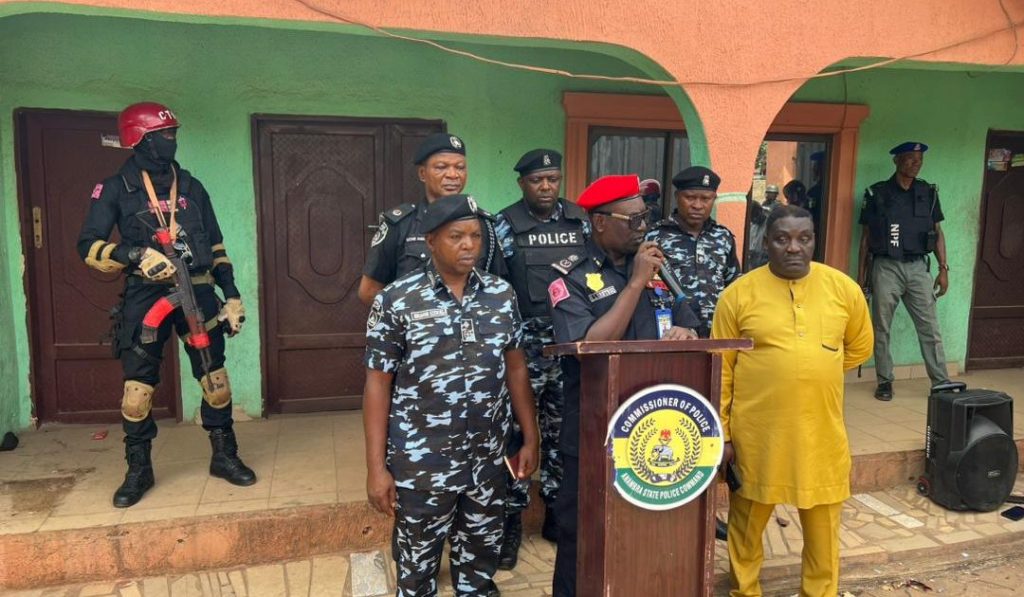The Anambra State Police Command welcomed its 35th Commissioner of Police, CP Ikioye Orutugu, following the redeployment of the former commissioner, CP Nnaghe Itam, to the force headquarters. CP Orutugu’s arrival was immediately marked by his proactive approach to a chilling case that had gripped the community: the murder of three young siblings in Nnewi. The children, a five-year-old boy and two girls aged seven and nine, were discovered lifeless inside a refrigerator in their home while their parents were away. The horrific nature of the crime prompted an immediate on-site assessment by the newly appointed commissioner, underscoring his commitment to addressing the escalating security concerns in the state.
CP Orutugu’s visit to the crime scene was not merely an investigative procedure but also a gesture of empathy and reassurance to the grieving parents. He toured the house and the specific room where the tragedy occurred, listening to the parents’ account and offering condolences. Addressing the media, CP Orutugu emphasized his determination to uncover the circumstances surrounding the children’s deaths and bring the perpetrators to justice. He distinguished this case from previous incidents involving kidnappings or disappearances, pledging a thorough investigation that would leave no stone unturned. This commitment signified a renewed focus on resolving such heinous crimes and providing closure to the affected families.
Beyond this specific case, CP Orutugu outlined his broader vision for security in Anambra State. Recognizing the state’s potential hindered by criminal activities, he declared a mission to reclaim public spaces and restore law and order. He identified key areas of concern, including attacks on civilians and security personnel, abductions, and the destruction of government infrastructure. This comprehensive approach signaled a shift towards a more proactive and strategic policing model, addressing the root causes of insecurity and fostering a safer environment for all residents. He acknowledged the collaborative efforts already in place, such as the “Operation Udo Ga Chi” initiative, emphasizing the importance of community engagement and partnerships with security agencies, vigilante groups, and other stakeholders.
CP Orutugu’s strategy for achieving this vision revolves around several key pillars. Firstly, he highlighted the importance of strategic intelligence gathering and deployment. This suggests a move towards a more data-driven approach to policing, utilizing intelligence to anticipate and prevent criminal activities rather than simply reacting to them. Secondly, he stressed the significance of robust synergy with sister security agencies, recognizing that collaborative efforts are crucial in tackling complex security challenges. This collaborative approach extends to engaging organized vigilante groups and other stakeholders, harnessing local knowledge and resources to enhance security efforts.
The new commissioner also recognized the vital role of the media in shaping public perception and disseminating accurate information. He solicited their support in reporting security-related incidents objectively and professionally, emphasizing the importance of transparency and avoiding sensationalism. This call for responsible reporting underscores the need for a balanced narrative that informs the public without fueling fear or misinformation. He further urged the citizens of Anambra State to remain law-abiding and vigilant, encouraging their continued partnership with the police and other security agencies. This emphasis on community policing recognizes that effective crime prevention requires active participation from the public, fostering a sense of shared responsibility for safety and security.
CP Orutugu’s background and experience provide a solid foundation for his ambitious plans. Born in Bayelsa State and holding degrees in Political Science, Public Administration, and Sociology of Education, he brings a multidisciplinary perspective to his role. His career trajectory, spanning various positions across the country, including roles in homicide investigation, highway patrol, mobile police command, and specialized training, has equipped him with a diverse skillset and a deep understanding of the complexities of law enforcement. This broad experience positions him well to address the multifaceted security challenges facing Anambra State. His academic background further suggests a commitment to evidence-based policing and a nuanced understanding of the social factors contributing to crime.














